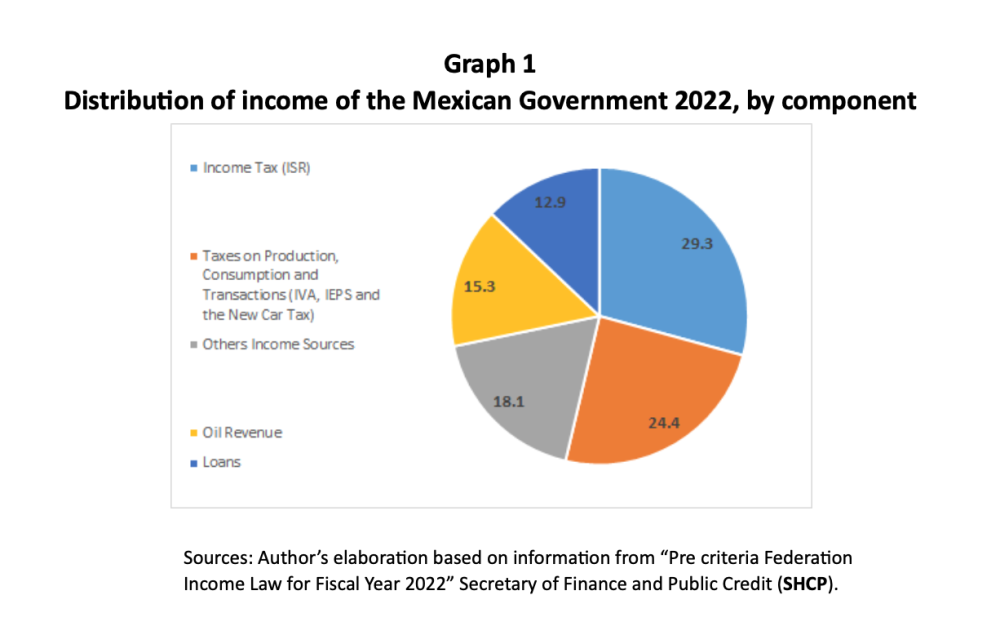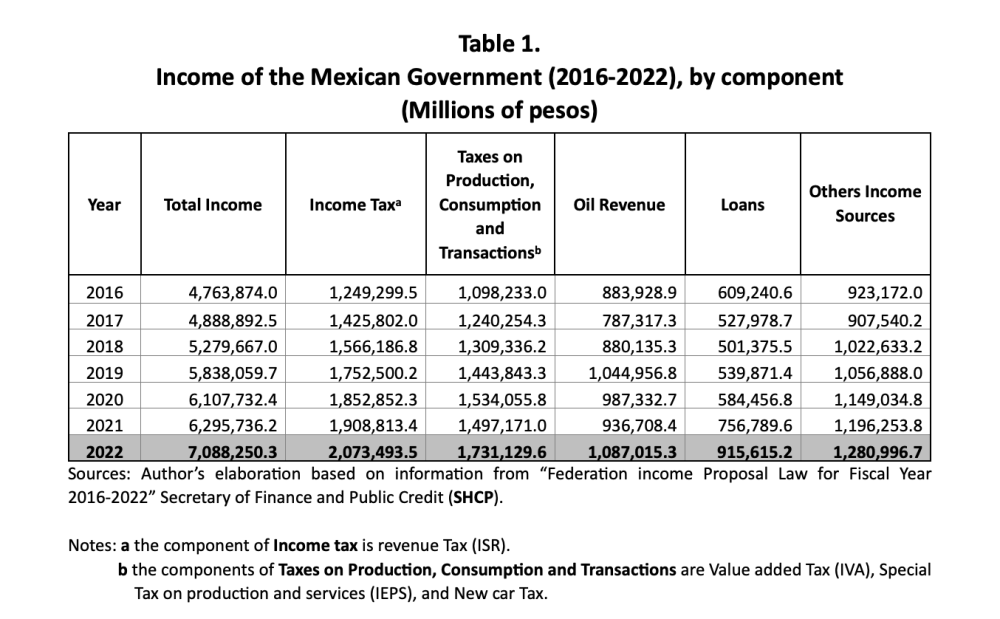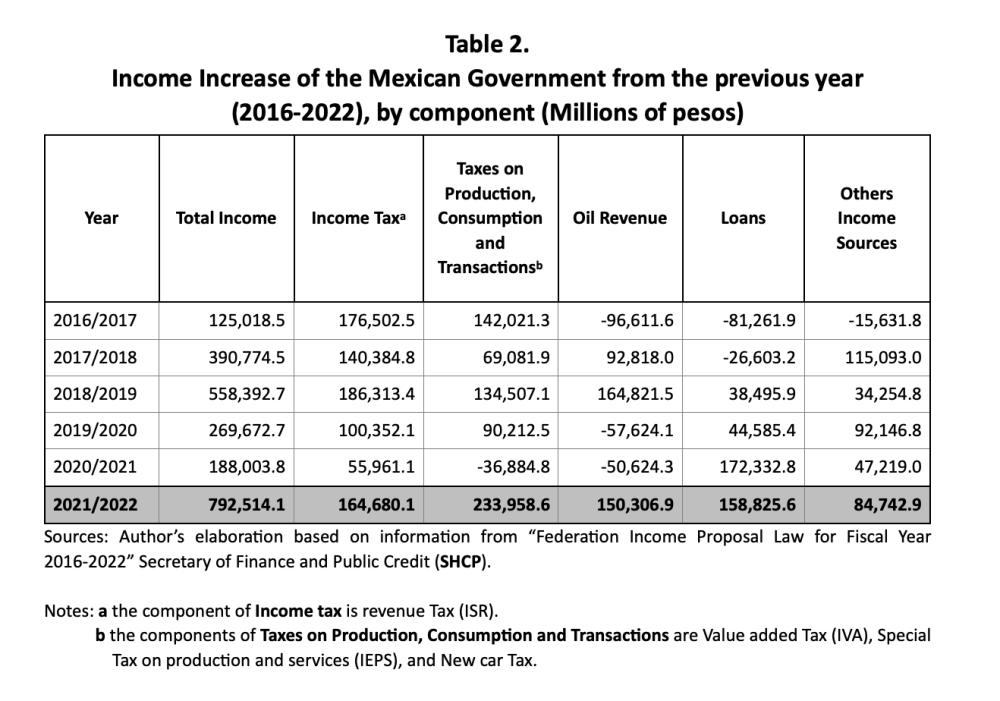This article analyzes the likelihood that the Mexican government will miss its income target of 7,088,250.3 million pesos for next fiscal year (2022). The possibility arises because the new finance (Hacienda) secretary Rogelio Ramírez de la O has estimated that for 2022 the level of income will increase 12.6 percent in relation to the previous year. In order to achieve this goal, the Mexican Government has announced that next year it will reduce tax evasion by the informal economy. Under this strategy, the Income Tax (ISR) and Taxes on Production, Consumption and Transactions (IVA, IEPS and the New Car Tax) would have to increase by 164,680.1 and 233,958.6 million pesos respectively in relation to the previous year. In simple words, the Income Tax (ISR) would have to increase by 8.6 percent and the Taxes on Production, Consumption and Transactions by 15.6 percent. Without a tax reform that supports an increase in collection, it seems likely that the new finance secretary is over-estimating annual collections. Furthermore, most of the big taxpayers have already caught up with their taxes, and since the government has already spent the funds for the stabilization of public finances (FEIF and FEIEF)1, additional sources are exhausted. This is combined with weak overall economic growth; the recovery of the industrial sector has not been as expected and the growth of the service sector is largely due to the increase in the informal sector triggered by the loss of jobs in the industrial sector. Finally, the income estimate assumes an increase in oil revenue of 150,306.9 million pesos and government debt (loans) by 158,825.6 million pesos in relation to the previous year. This is equivalent to increases of 16.0 and 21.0 percent respectively. It is worth pointing out that the Mexican government has projected a 2022 level of crude production of 1.867 million barrels per day (MBD) at an average price of $53.10 USD per barrel while this year’s production stabilized at around 1.700 MBD at an average price of $55.00 USD. The Mexican Congress must review this income proposal and should call for technical discussions to address government revenues.
Analysis of the estimated tax revenues of the Mexican government, for fiscal year 2022
The new finance secretary Rogelio Ramírez de la O has estimated that the 2022 Total Federal Income would be 7,088,250.3 million pesos, with 29.3% derived from Income Tax (2,073,493.5), 24.4% from Taxes on Production, Consumption and Transactions (1,731,129.6), 18.1% from Other Income Sources (1,280,996.7), 15.3% from Oil Revenue (1,087,015.3), and an additional 12.9% from loans (915,615.2) (See Graph 1).

Since the beginning of the administration of President Andrés Manuel López Obrador (AMLO) tax evasion by large taxpayers has been decreasing. This has been made possible due to increase tax collection in Mexico. However, since most of the big taxpayers have caught up with their taxes, this source of additional income is diminishing. Besides, the Budgetary Income Stabilization Funds (FEIP and FEIEF), which in 2018 had a total amount of 368,492.9 million pesos were spent in the last 3 years. In order to achieve 2022 revenue goal, the Mexican Government has announced an increased effort to reduce tax evasion in the informal economy.
Table one shows the Income of the Mexican Government by component from 2016 to 2022. The Mexican government estimates a 2022 economic growth rate of 4.1%, which will allow total revenues to increase. However, it should be noted that all financial consulting firms estimate lower growth for the Mexican economy for next year as the industrial sector shows a slow recovery so far in 2021. Despite this, the estimate of total income increased from 6,295,736.2 in 2021 to 7,088,250.3 million pesos in 2022. This amount is equivalent to an increase of 12.6 percent. This increase in tax collection could be more credible if it were supported by a tax reform.

Table two shows the Income Increase of the Mexican Government from the previous year. As we can see, the government debt (Loans) has increased in recent years despite the fact that monthly reports from the Ministry of Finance (SHCP) show that public revenues break collection records each month. Additionally, the Taxes on Production, Consumption and Transactions increased by 233,958.6 million pesos in relation to the previous year. Another point that stands out is that the AMLO administration estimates that for next year the increase in oil revenues will reach a record of 150,306.9 million pesos. The Mexican government has projected a 2022 level of crude production of 1.867 million barrels per day (MBD) while this year’s production stabilized at around 1.700 MBD. Therefore, Petroleros Mexicanos (PEMEX) will need to increase oil production by 167 MBD to meet this target.

Conclusion
Without tax reform it is difficult to believe that the Mexican government's tax collection for 2022 will reach the projected 7,088,250.3 million pesos. This is particularly likely as 1) projections suggest that a full economic recovery will not occur this year, 2) most big taxpayers have already caught up with their taxes and 3) the government no longer has savings. The Mexican Congress must review this income proposal and should call for technical discussions to address government revenues.
Without a doubt, the Mexican government has great challenges next year in regards to fiscal matters.
1 Note: In 2018, the Budgetary Income Stabilization Fund (FEIP) had 279,770.7 million pesos while in the same year the Stabilization Fund for the Income of the Federal Entities (FEIEF) had 88,722.2 million pesos.
Author

Mexico Institute
The Mexico Institute seeks to improve understanding, communication, and cooperation between Mexico and the United States by promoting original research, encouraging public discussion, and proposing policy options for enhancing the bilateral relationship. A binational Advisory Board, chaired by Luis Téllez and Earl Anthony Wayne, oversees the work of the Mexico Institute. Read more

Explore More
Browse Insights & Analysis
360° View of How Southeast Asia Can Attract More FDI in Chips and AI



